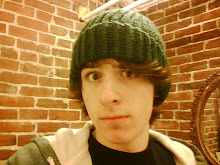I think the title explains this post pretty accurately.
In Good Company (2004) The thing I like about this film is that it doesn’t try to be something it’s not. It knows it’s a light drama with a likable cast, but it actually gives them some interesting and realistic situations to handle. I also enjoy that, even though it’s PG-13 (for “some sexual content and drug references”) it’s a very clean film, one you could watch with a group of teens and later discuss how characters handled situations and how people treated each other. Basically it’s the moral opposite of American Pie, which was half directed by In Good Company's Paul Weitz.
The thing I like about this film is that it doesn’t try to be something it’s not. It knows it’s a light drama with a likable cast, but it actually gives them some interesting and realistic situations to handle. I also enjoy that, even though it’s PG-13 (for “some sexual content and drug references”) it’s a very clean film, one you could watch with a group of teens and later discuss how characters handled situations and how people treated each other. Basically it’s the moral opposite of American Pie, which was half directed by In Good Company's Paul Weitz.
Denis Quaid, Topher Grace and Scarlet Johansson work well together here. Quaid is Johansson’s father, who’s new boss is the young Topher Grace who starts getting romantically involved with Quiad’s daughter. The situations never get melodramatic or over the top, and by the end you can sympathize with each character. A nice change of pace from the barrage of lame crude comedies we see all the time.
The Final Cut (2004)
On the surface, this is a typical dystopian future sci-fi thriller with your basic “is technology too powerful?” theme. The Final Cut, however, is elevated above your average dystopian future sci-fi thriller due to the interesting look and its noir-ish atmosphere. When I say interesting look, I’m referring mostly to the fact that the film looks as though it were taking place today, save for a few leaps in technology, mainly the “Zoe” memory chip. This microchip is placed in your brain to record your memories, which allows others to view an edited version to remember you by after you have passed away. Robin Williams plays an editor, aka “cutter”, of diseased individuals’ memories who gets wrapped up in a plot that I won’t reveal here. Half the fun of The Final Cut's plot is that it isn’t particularly new or revolutionary, but it has interesting twists and turns as well as some very well thought out observations on the powers of technology.
This, in my opinion, is the most underrated film on this little list, such as it is. Down in the Valley carries some of the feeling of boredom and regret found in films such as The Last Picture Show while having a character that is inspired by Travis Bickle in Taxi Driver. In fact, Edward Norton, as the seemingly always calm and together Harlan, has a scene straight out of Taxi Driver where he talks to an imaginary foe while staring himself down in a mirror, playing with his guns. Norton and Evan Rachel Wood (as Tobe) are excellent together as two troubled young people who feel trapped by high powers (Tobe by her father and Harlan by society). Tobe’s father, Wade (David Morse), is an untrusting, controlling, harsh man who doesn’t enjoy having his power over his children questioned by Harlan, even when Harlan calmly and politely introduces himself to him and his rather meek son Lonnie (Rory Culkin). It becomes obvious Tobe and Lonnie could use a better father figure in their life, but when Harlan and Tobe’s relationship starts to end it becomes clear that Harlan may not be as reliable a male role model as he first appeared.
Some have been quick to judge Down in the Valley as a straight-up rip-off of Taxi Driver, but I think that’s a bit of a harsh accusation. I think it’s obvious writer/director David Jacobson has seen Taxi Driver and was heavily inspired by it, but instead of saying Down in the Valley is a rip-off, I would say it takes some of the basic ideas and elements of Taxi Driver and reworks them in a different direction and to a different degree.
Lucky Number Slevin (2006)

Why Lucky Number Slevin isn’t more well known is beyond me. With a cast including Morgan Freeman, Bruce Willis, Ben Kingsley, Stanley Tucci, Josh Hartnett and Lucy Lui you’d think more people would have seen it. On top of a star-studded cast, this film has more style than any film Guy Richie has ever made with dialog Tarantino fans would eat up and twists reminiscent of The Usual Suspects. What I love about Lucky Number Slevin most is probably the style. Sure the actors are good, the dialog is fun and the plot is clever and engaging (albeit not quite as air-tight as that Usual Suspects reference might lead you to believe), but this films has so much style it almost wouldn’t matter if the plot turned out to suck. Slevin is filled with colors, hit men, mob bosses, music and insanely cool wallpaper (the kind you would probably never see anywhere outside a film like this), just to name a few things. If you think Guy Richie is overrated (which he is) and want to see something really slick and entertaining, check this film out.








